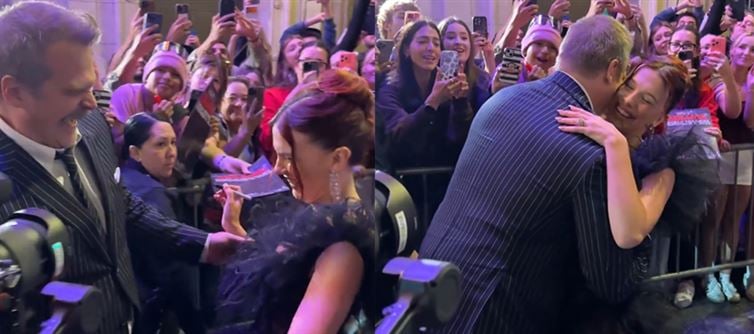
The Perfect Father-Daughter Duo — Or the Perfect Illusion?
When David Harbour and Millie bobby Brown walked onto the red carpet for the Stranger Things Season 5 premiere, the internet exhaled in collective relief. There they were — Hopper and Eleven — the emotional core of Netflix’s biggest phenomenon, smiling, posing, and laughing like the family we all wanted to believe they were.
But behind the flashbulbs and fanfare lies a storm of conflicting narratives — one part heartwarming reunion, one part silent tension.
Because just months earlier, reports surfaced that Millie bobby Brown had filed a formal workplace complaint against Harbour, alleging bullying and professional misconduct during early production discussions for Season 5.
So what’s the truth — genuine affection, staged civility, or something more complicated in between?
From Fiction to Family: The Bond That Defined a Generation
Since 2016, Stranger Things has thrived on the raw emotional bond between Jim Hopper, the gruff sheriff with a broken heart, and Eleven, the telekinetic child soldier desperate for love and belonging.
That dynamic wasn’t just acting — fans saw it as authentic emotional alchemy. Harbour publicly called Millie his “favorite human,” and Brown often referred to him as a “real-life dad figure.”
Interviews, behind-the-scenes videos, and years of promotion cemented the pair as the emotional heartbeat of the series — a father-daughter relationship for the ages, both on-screen and off.
Which is why the allegations — and the apparent tension behind the scenes — hit like a shockwave.
The Fallout: When Admiration Turns Into Accusation
According to multiple industry reports, Millie bobby Brown filed a formal complaint to Netflix’s internal HR department ahead of Season 5 production, citing “hostile professional behavior and verbal intimidation.”
Insiders emphasize the complaint was not personal or romantic, but rooted in concerns over Harbour’s on-set conduct, reportedly stemming from creative disagreements and his intensity during rehearsals.
Harbour’s camp, meanwhile, dismissed the claims as “gross exaggerations of normal creative tension.” One insider described it as “a veteran actor trying to push performance limits and a young star asserting her authority.”
Still, Netflix reportedly stepped in with formal mediation sessions between the two before filming resumed — a move that suggests the matter was taken seriously.
The Premiere: Public Unity, Private Distance
Fast forward to the Stranger Things Season 5 premiere — a red carpet event designed to project one thing above all else: harmony.
The cameras captured smiles, laughs, and even a few nostalgic moments between Harbour and Brown. Fans online immediately celebrated with captions like, “They loved each other — the rumors were fake!”
But observers on the ground noted subtle cues of discomfort — brief interactions, managed poses, and a clear effort by Netflix’s PR handlers to control every frame.
To the public, it was reunion magic.
To industry watchers, it was damage control dressed as nostalgia.
Hollywood’s Favorite Mask: When Publicity Outshines Pain
It wouldn’t be the first time hollywood stitched over cracks for the sake of marketing.
The entertainment machine thrives on image — and Stranger Things is not just a show, it’s a billion-dollar brand.
Both actors are professionals, and both know the stakes.
A public fallout before the final season could fracture the narrative Netflix has spent nearly a decade building.
So they smiled. They posed. They played their roles — not as Hopper and Eleven this time, but as Harbour and Brown, the franchise’s human shield against controversy.
The Truth Between Them: Respect, Regret, and Reality
people forget that behind the fandom, the GIFs, and the red carpets, are two human beings — one, a veteran actor known for his raw, unfiltered approach; the other, a young global superstar who’s grown up under the world’s gaze.
Their chemistry was — and still is — undeniable. But chemistry doesn’t erase friction.
Sometimes, it’s the spark that creates it.
industry sources describe their current relationship as “cordial but cautious” — respectful, but emotionally distant.
Brown, now 21, has matured from child actor to global brand, while Harbour remains the intense, method-driven artist who sometimes blurs the line between passion and pressure.
It’s a story not of villains and victims, but of two people struggling under the weight of fame, expectations, and the world’s constant gaze.
Media Spin: When Outrage Becomes a Business
Social media quickly turned the story into a binary war: fans either defended Harbour as “misunderstood” or attacked him as “toxic.” Others claimed Brown exaggerated.
But few questioned the timing and tone of the leaks.
The entertainment press thrives on scandal-driven algorithms, often reducing complex workplace dynamics to clickbait feuds.
In this case, both actors have refused to engage publicly — a silence that speaks volumes. It’s less about guilt or innocence and more about exhaustion with a media cycle that monetizes mistrust.
The Bottom Line: Stranger Things May End, But The Truth Still Has Layers
Whatever happened behind the scenes, one truth remains — David Harbour and Millie bobby Brown changed television together.
Their performances shaped a generation, and their bond — even if bruised — remains part of pop culture history.
The Season 5 premiere may have been a staged truce, but it also reflected something deeper: two professionals putting story before self, showing up for a project that defined both their careers.
In the end, the Stranger Things universe thrives on blurred lines — love and pain, loyalty and betrayal, family and fracture.
Perhaps, so does reality.




 click and follow Indiaherald WhatsApp channel
click and follow Indiaherald WhatsApp channel